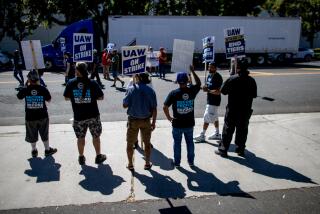With economy stumbling, Obama hails auto industry bailout
- Share via
Reporting from Toledo, Ohio — Facing a cascade of slipping economic signs that could endanger his reelection, President Obama sought to shift attention to a decision he made early in his term that appears to be paying off: bailing out the auto industry.
Obama’s appearance Friday at a Chrysler plant in this politically important state showed how few economic stories he can highlight. New figures Friday showed unemployment rose to 9.1%, the second straight month that the jobless rate climbed. Speculation grew that the economy might slip into another recession, which would hurt families nationwide just as the 2012 campaign begins.
Obama’s trip — his 13th to Ohio since his inauguration — follows a week’s worth of coordinated messages in which administration officials depicted him as being able to make the “gutsy” decisions that should give voters confidence in uncertain times.
Drawing attention to the auto bailout would have been risky at one point. Before the 2010 midterm elections, independent voters disdained bailouts, deficits and stimulus measures.
But Democrats now believe the auto bailout in particular is a way to distinguish themselves from Republicans. They see government intervention as an important tool in protecting both workers and business from the shocks of unfettered markets, and they believe voters buy that argument.
They point to the record of the domestic car companies, which have bounced back from their near collapse in 2008-09. Chrysler last week repaid $7.6 billion in loans to the U.S. and Canada, six years ahead of schedule. In all, the company has returned $10.6 billion of $12.5 billion it received in U.S. aid.
Taxpayers are expected to lose about $14 billion of the $80 billion spent under the Obama and George W. Bush administrations to bail out Chrysler, General Motors and their suppliers. But companies are adding jobs and gaining market share against international competitors.
Nevertheless, the economy remains Obama’s largest vulnerability. A CNN poll late last month showed that 58% of respondents disapproved of his handling of the economy, compared with 41% who approved.
“He’s struggling to find something he can go out and talk about,” said David Winston, a Republican strategist.
The president is relying on the fact that “Chrysler still exists and didn’t disappear under his watch,” Winston said. “It’s not really a great statement of success.”
The jobs report covering May won’t help matters. Nearly 14 million people were out of work — and of those, 45% had been jobless for at least six months.
On top of that, even those with jobs are stressed by rising prices and sinking home values. Gas is an average of $3.79 a gallon, up from $2.72 a year ago. And a recent national housing study showed that home prices were down 5.1% in the first quarter of 2011 from one year before.
Standing in front of a row of half-built Jeep Wranglers in Toledo, Obama said that rather than let the carmakers fail or keep them afloat through loans with no strings attached, he demanded that they retool in return for billions in federal aid. Administration economists calculate that the decision saved 1 million jobs.
“We said that if everyone involved was willing to take the tough steps and make the painful sacrifices that were needed to become competitive, then we’d invest in your future and the future of communities like Toledo, that we’d have your back,” Obama told a friendly audience of several hundred workers.
Obama acknowledged the broader problem he faces. “Now, I don’t want to pretend like everything is solved,” he said. “We’ve still got a long way to go not just in this industry, but in our economy, for all our friends, all our neighbors who are still feeling the sting of recession.”
Even a Jeep would have trouble navigating the economy’s “rough terrain,” the president said at one point.
Shouts of ‘No!” rose from the seats.
“A Wrangler can go over anything, huh?” Obama said.
“The naysayers talked about socialism, government takeover and money down a rathole. Clearly they were wrong,” said Sen. Sherrod Brown (D-Ohio), in an interview after Obama’s speech. “The conservative politicians were almost unanimous against this because they don’t believe government ever has a positive role in anything, and this is a partnership between government and business.”
Brown wore a button on his suit coat that said “PAID,” a reference to Chrysler’s loan payback. The Obama administration is selling its remaining 6% stake in the company to Fiat. “Soon, Chrysler will be 100% in private hands,” Obama said. “Early. Faster than anybody believed.”
Staff writer Don Lee in Washington contributed to this report.






